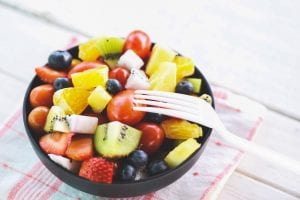What to Eat When You’re Depressed
We’ve all been there. You arrive home from work after a particularly stressful day, or you’re feeling upset after having an argument with your significant other, and you look to food for comfort. Whether it’s a pint of ice cream that you eat straight out of the carton or boxed macaroni and cheese that brings the comfort you’re looking for, food can provide the emotional relief we’re looking for. But while it may make us feel good at the moment, the food choices we make can drastically impact our mood for the worse over time.
While enjoying the occasional sweet treat will not harm you and your favorite desserts should be consumed in moderation, limiting unhealthy habits and picking up a healthy diet can be a great addition to traditional depression and anxiety therapy. Not only will a healthy diet contribute to your physical well-being, but it will also play a large role in your mental health. We have included a list of some of the foods that may worsen depression and anxiety as well as some foods that you should add to your diet instead.
Foods to Avoid:
Refined Sugar
You might not want to hear this, but that Twix bar is not doing your mental health any favors. It might taste good and give you a sugar rush for a short period of time, but afterwards your energy levels can crash and blood glucose levels drop, resulting in disrupted moods, lack of energy, and insomnia.
Caffeine
Beverages with caffeine, such as energy drinks and coffee, as well as caffeine-containing foods like chocolate, can induce feelings of nervousness and agitation once consumed. When struggling with depression or anxiety, it is best to avoid caffeine, since it has a natural stimulant effect.
Alcohol
Those who are battling depression and anxiety may seek self-medication in the form of alcohol or drugs. According to the Anxiety and Depression Association of America, about 20 percent of Americans with an anxiety or mood disorder such as depression, have an alcohol or other substance use disorder as well.
While the substances may provide temporary relief, they can worsen the disorders, interrupt sleep patterns, cause mood swings, and affect personal relationships. It’s important to talk to a doctor if you or a loved one is abusing substances.

Processed Foods
Processed foods — such as white bread, freezer meals, cereal, pasta, and chips — can be convenient and easy to prepare and consume, but the negative effects that the foods can have on your mental health will not be as easy to treat. The processed foods can leave you feeling fatigued, irritated, and sad.
Fried Foods
Nothing screams comfort food more than a basket of fried chicken and a side of french fries, but when focusing on choosing meals that will promote mental health and curb depressive thoughts, it’s important to stay away from hydrogenated oils, trans fats, and saturated fats.
Foods to Choose:
Omega 3s
Adding more omega-3s into your diet has shown to improve brain function and manage depression symptoms. Fish, nuts, seeds, and dark-green leafy vegetables are rich in omega-3 fatty acids, but you can also find over-the-counter supplements, which will help make sure you are getting enough of the nutrients you need.
Vitamin D
Many people obtain vitamin D through sun exposure, but the winter months can make that more difficult to do. However, you can still give your body the vitamins needed to fight depression through dietary sources. By incorporating more oily fish, fortified dairy products, eggs, and beef liver into your diet or by taking a daily vitamin, you can experience the benefits of Vitamin D all year.
Fruits and Vegetables
Growing up, your parents may have lectured to “make sure you’re eating your fruits and vegetables” and although they may not have been aware of the link between diet and depression at the time, they were on to something. When you’re craving something sweet, go for a bowl of fruit instead of a piece of candy. Eating the right carbohydrates will still release serotonin, without inducing an energy and mood crash afterwards.

Selenium
Some studies have found a link between selenium deficiencies and depression. By increasing your body’s selenium intake through more whole grains, nuts, seafood, and meats, you might see improved mood and reduced anxiety.
Probiotics
When considering what food options impact mental health, many do not realize that gut health is related to the brain.
“The microorganisms in our gut can communicate with the brain and several systems that could play a role in depression and anxiety, and the composition of the gut microbiota is influenced by nutrition,” researcher and PhD student Anika Knüppel said.
Foods with probiotics — such as yogurt and kefir — may boost the levels of beneficial bacteria in the gut and reduce symptoms of depression. Probiotics are also beneficial to boosting the immune system, improving digestion, and managing weight.
Link Between Diet and Depression
Changing your diet to incorporate more whole foods and proteins and less processed meals and refined sugars is a start to feeling better and reducing depression symptoms. Introducing a healthy diet into your lifestyle in addition to traditional therapy options, such as transcranial magnetic stimulation, can make the treatment methods more effective.
If you feel TMS Therapy may help you or a loved one who is suffering from depression, call TMS Center of the Lehigh Valley at 610-820- 0700.

